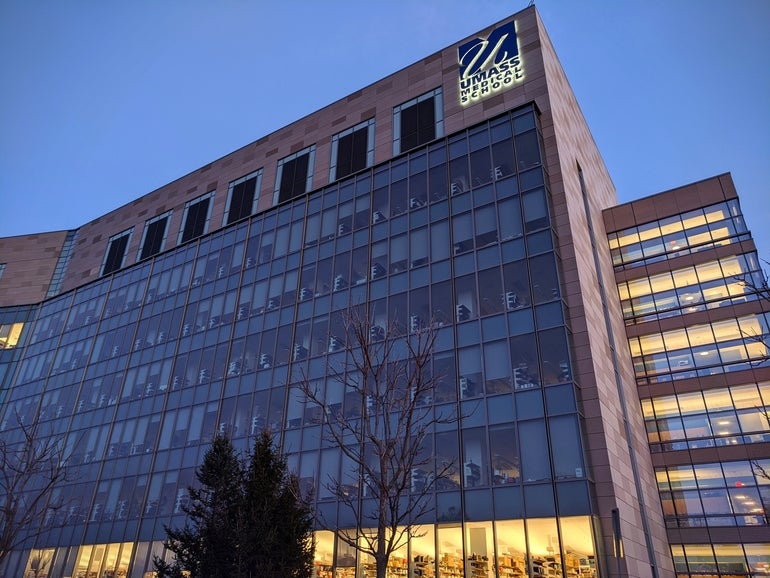Instituting a change at a college or university has been compared to “trying to move a cemetery,” Emerson College President Lee Pelton said during a Greater Boston Chamber of Commerce panel Wednesday.
But the demands of the COVID-19 pandemic have forced a series of swift changes across higher education — most notably, the widespread abrupt transition to remote learning in the middle of spring semesters — and the college leaders who participated in Wednesday’s panel said schools will need to be nimble as they look ahead to the still-uncertain fall term.
“We’re going to have to be more flexible than we’ve ever been in the way we offer education,” Boston University President Robert Brown said.
Colleges, universities and their thousands of students, faculty and staff members make up a major part of both the Boston area economy and its cultural identity. The five presidents who joined the chamber’s panel said things will look different on their campuses when fall arrives.
The state’s four-phase reopening plan calls for higher education institutions to each craft their own individual reopening plans, with safety guidelines and health monitoring protocols to be implemented “across all elements of campus life — including classrooms, housing, dining, facilities and services.”
The first phase of the state’s plan, launched Monday, allows colleges and universities to repopulate their research laboratories and clinics and to restart functions necessary to prepare their campuses, with social distancing measures in place.
Pelton, who moderated the panel, said Emerson is in the process of “trying to determine the structure of the fall term” with the hope of having some in-person classes that would likely be complemented by remote learning. He said the school plans to make an announcement within the next two and a half weeks.
Northeastern University President Joseph Aoun said his school’s goal is for a “full reopening” in the fall, which would involve Northeastern doing its own testing and tracking for COVID-19, along with looking “at the density of everything in the university.”
Testing for the coronavirus will also be an “essential part” of the return to campus at BU, which is working to set up its own testing facility, Brown said.
“The biggest changes are going to be in the living conditions, the way our residential campuses are going to work, how our students are going to have to segregate themselves into what I would call households, smaller groups, and try to decrease the amount of mixing among our students,” Brown said.
The dynamics of reopening at Bunker Hill Community College, a commuter school with campuses in Charlestown and Chelsea, will be closely linked to what happens with the MBTA and how the city of Boston’s reopening process unfolds, President Pam Eddinger said.
“We are planning that a majority of our classes will be hybrid, remote, or online, with a smaller number of on-ground classes and of course our on-ground labs,” she said.
Chelsea has been the Massachusetts city hardest hit by the pandemic, in terms of infection rates, and Eddinger said she’s “never seen such stresses on students.” Some students, she said, are grappling with things like lack of technology, internet access, or a quiet place to study and participate in online classes, while also juggling child care and struggling to meet basic needs around food and housing.
“We’re finding that students sometimes just disappear because they can’t get online, so we ended up purchasing a lot of the technical equipment and delivering groceries to these students,” she said. “My fear is that the students who are truly in stress, we’re not hearing from and they will go away and they will go away permanently.”
The University of Massachusetts has also taken steps to provide laptops to students who need them, system president Marty Meehan said. Meehan, a former congressman, said he worked with the state’s Congressional delegation to see support for colleges and their students included in the $2 trillion stimulus package known as the CARES Act.
“I’m worried about how we’re going to meet these students looking into the future, because I don’t think the state is going to have the money to invest in that,” Meehan said.
He continued, “This represents a major challenge for this country. If we leave these folks behind, we’re not going to have economic prosperity in this country.”
During the panel, Meehan’s office announced that he plans to propose a tuition freeze for the 2020-2021 academic year.
The UMass system is “preparing for all options” this fall, Meehan said, including opening its five campuses with social distancing guidelines in place, online education and hybrid models.
He said he expects “dramatic changes” to the higher education landscape as a result of the pandemic and that, while there will always be some students who want the four-year, on-campus experience, he sees online education as becoming more and more important.
Higher education “needs to be more nimble,” Meehan said, particularly as it confronts demographic changes in the region that will translate to a smaller student population.
“If you look at Massachusetts in a whole, or New England, I don’t think there’s any way demographically to support the same number of colleges and universities, and in fact, I think this crisis is going to accelerate the challenges of many tuition-dependent institutions that don’t have large endowments,” he said. “I think that Massachusetts needs to figure out a way to make sure that those changes and the consolidation or closing of colleges and universities is done in a way that’s effective for the people of Massachusetts, but also that we collaborate more to prepare for that, because that day is coming.”

